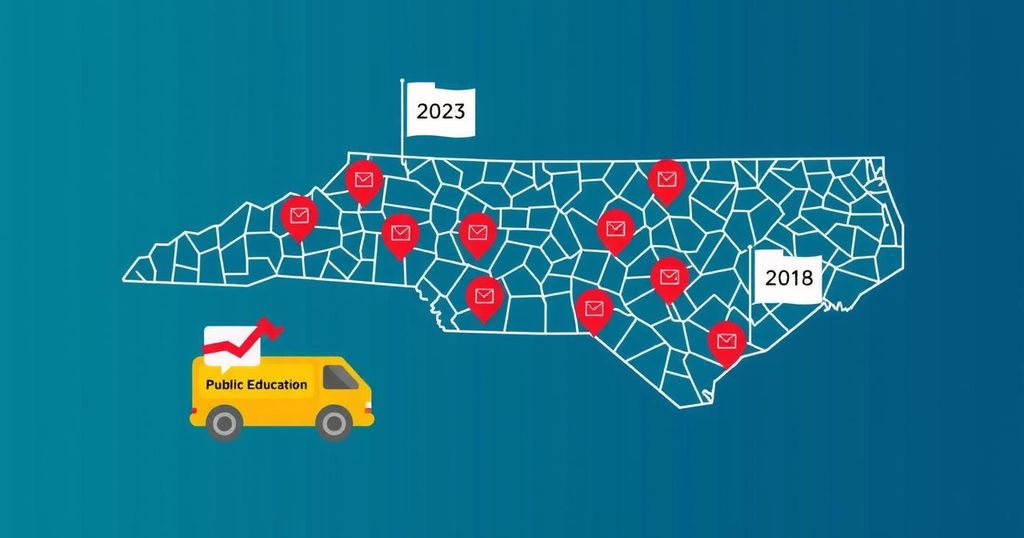World news
AFRICA, CIVIL RIGHTS, COUNCIL OF STATE, DEAN, DEANNA TOWNSEND - SMITH, DEMOCRATS, ELECTION, ELECTION INTEGRITY, GOP, GREEN, JOSH STEIN, LEGISLATION, MICHELE MORROW, MO GREEN, NC, NORTH CAROLINA, PRESIDENTIAL ELECTION 2024, PUBLIC INSTRUCTION, RACHEL HUNT, REPUBLICAN, ROY COOPER, SOUTH AFRICA, STEIN, VIRGINIA
Sofia Rodriguez
0 Comments
What Do NC’s 2024 Election Results Mean for Public Education?
The recent North Carolina elections have led to major changes in public education management, with Democrat Mo Green winning the position of state superintendent and Democrats regaining control of key state offices. This shift might foster bipartisan cooperation and increased funding for public schools amid previous trends of funding diversion to private institutions. However, challenges remain as stakeholders remain cautious about future legislative actions and the broader implications of federal policies on state education funding.
North Carolina’s elections have signaled a significant shift in the landscape of public education governance, as Democrat Mo Green has emerged victorious as the new state superintendent of public instruction, edging out his Republican opponent by a narrow margin of 2%. With this election, Democrats have reclaimed key positions, including the lieutenant governor’s office and four council of state seats, which may enhance bipartisan collaboration or lead to intensified competition over educational policies. Governor-elect Josh Stein will appoint the majority of the state’s Board of Education, potentially reshaping educational directives in the state. This election marks a pivotal moment for North Carolina’s public schools, where a recent trend had seen funding increasingly diverted from traditional public schools towards private and charter institutions via voucher programs. Green’s agenda emphasizes higher investments in early childhood education, increased educator salaries, and resources for disadvantaged students. His commitment to restoring respect for educators will entail reducing their burdens and improving their working conditions. He asserts that a collaborative approach, focusing on community partnerships and mental health supports rather than a heightened presence of law enforcement, will create a safer and more conducive educational environment. Despite this optimistic outlook, skepticism remains amongst educators. Some believe that, although the loss of the Republican supermajority in the legislature offers a glimmer of hope, it does not guarantee a substantial shift in the party’s educational funding priorities. The State Board of Education, which has largely been influenced by Democratic appointments, may see changes depending on how power dynamics shift with the new administration. The Board is pivotal, as it oversees educational policies shaped by the legislature, which has enacted controversial measures in the past to diminish the Board’s influence. Furthermore, the implications of broader political contexts, such as the policies of President-elect Donald Trump, could impact federal educational funding. Any potential cuts to federal support for schools, especially Title 1 schools that depend heavily on such funding, could exacerbate existing challenges for public education in North Carolina and beyond. As the dust settles on the election, all eyes will be on how these shifts will impact legislative collaboration and policy development surrounding public education in North Carolina. Advocates hope for a favorable environment conducive to nourishing investments in public education, fostering excellent opportunities for all students in the state.
In the context of the 2024 North Carolina elections, the state’s educational governance framework is poised for transformation, particularly with the election of Mo Green as superintendent of public instruction. This election has also resulted in the Democrats taking control of key state offices, leading to a broken supermajority in the state legislature. The coordinates of power over public education involve multiple individuals and bodies, including the governor, lieutenant governor, State Board of Education, and the legislature, each of which influences the operational and financial aspects of education in North Carolina. These developments have raised hope for better collaboration across party lines and increased funding for traditional public schooling, a contrast to the previously growing alternatives provided through school vouchers.
The 2024 elections have the potential to usher in a new era for public education in North Carolina. With a Democratic administration poised to prioritize education funding and reforms, stakeholders anticipate a collaborative approach that addresses longstanding issues within the public school system. However, skepticism remains regarding the willingness of Republican legislators to adopt a more conciliatory stance on educational priorities. Ultimately, how these dynamics evolve will significantly shape the effectiveness and quality of education for North Carolina’s students in the coming years.
Original Source: www.charlotteobserver.com




Post Comment